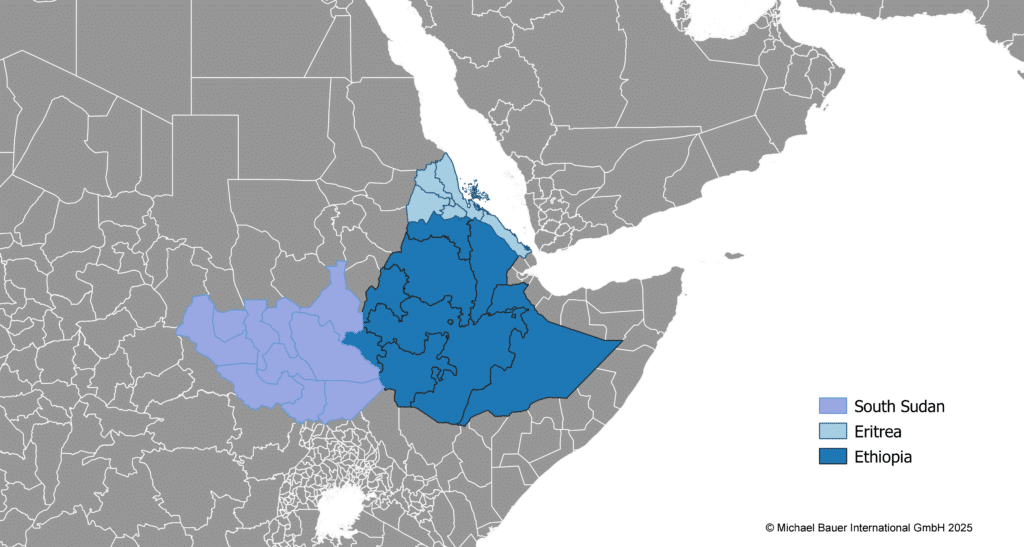CONIAS Risk Data | News
Developments in East Africa – Potential Risks
04/03/2025
As of March 30, 2025
Conflict data for East Africa points to troubling developments. In particular, two countries – Ethiopia and South Sudan – have seen a rise in violent clashes and their regional expansion in recent months. This blog post provides an overview of key political conflicts in the region and outlines the potential risks that may arise in the near future. The focus is on three specific conflict dynamics:

1. Ethiopia – Eritrea
During the war between the Ethiopian government and the Tigray People’s Liberation Front (TPLF) from 2020 to 2022, Eritrean troops supported the Ethiopian army. The Pretoria Agreement signed in November 2022 between the TPLF and the Ethiopian government called, among other things, for the withdrawal of all troops. Eritrea has yet to comply with this demand. Most recently, in February 2025, the UN Human Rights Council called for the withdrawal of Eritrean troops from the northern Ethiopian region of Tigray and urged an end to human rights violations such as looting, arbitrary arrests, and abductions.[1] Although tensions between the two countries had already been rising during the war against the TPLF, the tone of public discourse has sharpened further in recent months. Eritrea accuses Ethiopia of using it as a scapegoat and externalizing its internal conflicts. At the same time, former Ethiopian President Mulatu Teshome, for example, has accused Eritrea of destabilizing the north, especially the Tigray region.[2]
While a full-scale interstate war would significantly destabilize the Horn of Africa, it remains unlikely at present due to Ethiopia’s ongoing domestic armed conflicts with the Oromo Liberation Army (OLA) in Oromia and the Fano militia in Amhara. However, a rise in diplomatic tensions such as the recall or withdrawal of embassy personnel appears more probable. In particular, attention should be paid to potential future actions by Eritrean President Isaias Afwerki, who announced a general mobilization in March 2025.[3]
2. Ethiopia (TIA – TPLF)
Internal tensions within the TPLF have been steadily increasing for over a year. At the heart of the conflict are the TPLF chairman Debretsion Gebremichael and the President of the Tigray Interim Administration (TIA), Getachew Reda. While the dispute, primarily concerning the TPLF’s influence over the TIA, was mostly confined to intra-party disagreements until December 2024, a broader escalation has been observed since January 2025. Members of the Tigray Defense Forces called for the dissolution and restructuring of the regional government and openly aligned themselves with Gebremichael. This led to numerous protests, some of them violent, in Tigray in January and February 2025, and even some peaceful demonstrations in Ethiopia’s capital, Addis Ababa.
In the coming months, it will be crucial to see to what extent the Pretoria Agreement is upheld and implemented – and what the national government’s response will be. Prime Minister Abiy Ahmed has already urged his military to remain alert and ready.[4] As in 2020, the government may consider deploying Ethiopian troops to Tigray in an effort to prevent further regional destabilization.
3. South Sudan
From 2013 to 2018, South Sudan experienced a civil war between the current President Salva Kiir (Sudan People’s Liberation Movement – SPLM, of the Dinka ethnic group) and his rival Riek Machar (SPLM-in-Opposition, of the Nuer ethnic group). A peace agreement was signed in 2018, leading to the formation of a unity government with power-sharing, in which Machar became Vice President.[5] Tensions have been rising again over the past year. One reason is President Kiir’s increasing tendency to replace government officials without explanation. For instance, on February 10, 2025, the SPLM-IO-appointed Governor General Alfred Futuyo was removed from office in Western Equatoria, triggering violent clashes between soldiers of the South Sudan People’s Defense Forces (SSPDF) and the SPLM-IO. Notably, the peace agreement grants the SPLM-IO the right to appoint officials to designated national and local government positions and allocates nine ministries and 27 percent of regional government seats to the party.[6] Tensions have also escalated due to the postponement of the country’s first elections since its 2011 independence. Originally scheduled for November 2024, the elections were delayed by two years to 2026 without any significant progress on election preparations thus far.[7]
Violent clashes between the conflict parties peaked in February and March 2025. The immediate trigger was a series of armed confrontations between the so-called White Army, a Nuer militia loyal to Machar, and the SSPDF in the Upper Nile region, culminating in the militia’s seizure of a military base on March 4.[8] In response, ministers affiliated with Machar were arrested, and Uganda deployed troops to Juba, the South Sudanese capital, to bolster President Kiir’s position.[9] The conflict escalated further throughout March, including aerial attacks in Upper Nile. On March 26, Machar was arrested and placed under house arrest. A day later, on March 27, his party officially withdrew from the peace agreement.[10]
The risk of renewed civil war, accompanied by ethnically motivated violence between Dinka and Nuer populations, is therefore considered high in South Sudan.
About the author:
Sarah Pauly
Head of the CONIAS Risk Intelligence Africa Group
Michael Bauer International GmbH
The developments in East Africa highlight how dynamic and complex political conflicts can be – with potentially far-reaching implications for security, the economy, and investments. Making informed decisions in such volatile regions requires data-driven, continuously updated, and scientifically grounded analysis. MBI CONIAS Risk Intelligence delivers exactly that: Our data and assessments provide a solid foundation for evaluating political risks. This enables companies, organizations, and public actors to identify risks early and take proactive measures.
Sources:
[1] https://www.ohchr.org/en/press-releases/2025/02/human-rights-council-hold-its-fifty-eighth-regular-session-24-february-4 [12.03.2025].
[2] https://www.thereporterethiopia.com/43991/ [21.03.2025].
[3] https://hrc-eritrea.org/eritrea-orders-nationwide-military-mobilization-raising-fears-of-renewed-conflict/ [18.03.2025].
[4] https://borkena.com/2025/02/15/ethiopian-pm-abiy-ahmed-warns-military-generals-to-be-ready-as-security-concerns-escalate/ [23.03.2025].
[5] https://www.crisisgroup.org/africa/horn-africa/south-sudan/300-toward-viable-future-south-sudan [20.03.2025].
[6] https://docs.pca-cpa.org/2016/02/South-Sudan-Peace-Agreement-September-2018.pdf, Seiten 15-23 [30.03.2025].
[7] https://www.radiotamazuj.org/en/news/article/troika-peace-partners-exhibit-constant-failure-of-political-will-to-end-transitional-period-successfully; https://www.africanews.com/2025/02/26/un-warns-time-running-out-to-organise-credible-elections-in-south-sudan/ [23.03.2025].
[8] https://www.crisisgroup.org/africa/horn-africa/south-sudan/south-sudan-precipice-renewed-full-blown-war [17.03.2025].
[9] https://www.aljazeera.com/news/2025/3/7/fighting-flares-in-south-sudan-is-the-2018-peace-deal-in-danger; https://www.aljazeera.com/news/2025/3/11/uganda-deploys-troops-in-south-sudan-as-civil-war-fears-grow [23.03.2025].
[10] https://www.africanews.com/2025/03/27/south-sudan-opposition-party-says-leaders-arrest-cancels-peace-deal/ [30.03.2025].